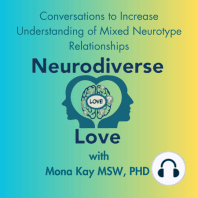67 min listen

Different Ways of Connecting, Socializing & Showing Empathy in a Mixed Neurotype Relationship-Conni Schwaerzer-Dutta
Different Ways of Connecting, Socializing & Showing Empathy in a Mixed Neurotype Relationship-Conni Schwaerzer-Dutta
ratings:
Length:
60 minutes
Released:
Nov 1, 2022
Format:
Podcast episode
Description
During this episode you will hear from another AANE certified therapist, Constanze Schwaerzer-Dutta. Conni lives in Germany and shares her own self-discovery journey and what made her wonder if she might be autistic. She shares about the challenges she was having in a training for family therapists that made her move forward on pursing an autism diagnosis. As a trainer, consultant and therapist Conni works to understand each person's perspective. When she is counseling neurodiverse couples she serves as a translator and provides a safe space for both partners to learn tools that can help them reduce conflict.
During this episode, Conni shares important information about her personal and professional experiences including:
The value of combining problem solving and nurturing.
The importance of neurodivergent individuals trusting their own perception.
Understanding the fluidity of "gender identity".
Practicing "solidarity" as a way to show empathy.
The impact of cognitive empathy.
How things change when couples do "daily life" together.
Spoon theory and having an empty "social account".
Cognitive resources change when the relationship progresses.
Conversation and language can mean different things to each partner.
Learning what makes daily transitions smoother.
Speaking under pressure, overthinking and thinking too much and doing too little.
Being afraid to ask, guess or get it wrong.
Why neurodiverse couples have the same conversation 3 times!
Knowing that it is okay to do things in the order that works for you and your partner.
You can contact Conni through her website at: https://www.constanzeschwaerzer.de
_________________________________________________________________________________________________________________________________________
If you are interested in becoming an AANE certified therapist, or coach, or would like to register for the "Neurology Matters' training available through AANE, for couples or individuals in neurodiverse relationships, you can register at: aane.thinkific.com. Please use the code NeurodiverseLove25 to get 25% off the registration fee. To learn more about AANE, or to find an AANE certified therapist or coach in your area, please click here and look at the map halfway down the page.
_________________________________________________________________________________________________________________________________________
If you liked this episode, please subscribe to the podcast, so you don't miss an episode.
For more information about the support groups available for "neurodiverse couples" or the "neurotypical/non-autistic partners" please check out: www.neurodiverselove.com or follow Mona on Instagram @neurodiverse_love
You can also contact Mona at: neurodiverselove4u@gmail.com
Thank you for being a part of the Neurodiverse Love community!
---
Send in a voice message: https://anchor.fm/neurodiverse-love/message
During this episode, Conni shares important information about her personal and professional experiences including:
The value of combining problem solving and nurturing.
The importance of neurodivergent individuals trusting their own perception.
Understanding the fluidity of "gender identity".
Practicing "solidarity" as a way to show empathy.
The impact of cognitive empathy.
How things change when couples do "daily life" together.
Spoon theory and having an empty "social account".
Cognitive resources change when the relationship progresses.
Conversation and language can mean different things to each partner.
Learning what makes daily transitions smoother.
Speaking under pressure, overthinking and thinking too much and doing too little.
Being afraid to ask, guess or get it wrong.
Why neurodiverse couples have the same conversation 3 times!
Knowing that it is okay to do things in the order that works for you and your partner.
You can contact Conni through her website at: https://www.constanzeschwaerzer.de
_________________________________________________________________________________________________________________________________________
If you are interested in becoming an AANE certified therapist, or coach, or would like to register for the "Neurology Matters' training available through AANE, for couples or individuals in neurodiverse relationships, you can register at: aane.thinkific.com. Please use the code NeurodiverseLove25 to get 25% off the registration fee. To learn more about AANE, or to find an AANE certified therapist or coach in your area, please click here and look at the map halfway down the page.
_________________________________________________________________________________________________________________________________________
If you liked this episode, please subscribe to the podcast, so you don't miss an episode.
For more information about the support groups available for "neurodiverse couples" or the "neurotypical/non-autistic partners" please check out: www.neurodiverselove.com or follow Mona on Instagram @neurodiverse_love
You can also contact Mona at: neurodiverselove4u@gmail.com
Thank you for being a part of the Neurodiverse Love community!
---
Send in a voice message: https://anchor.fm/neurodiverse-love/message
Released:
Nov 1, 2022
Format:
Podcast episode
Titles in the series (100)
Neurodiverse Couples Coach, Minister, Wife and Mother in a Neurodiverse Marriage-Janelle Harding by Neurodiverse Love with Mona Kay